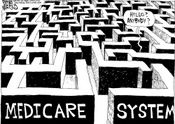Issues with System (Medicare) « Medicare

Issues with Medicare System:
Home and Community Services Copayment Equity Act of 2009
Hospital "Observation Status"
Home and Community Services Copayment Equity Act of 2009
- Patti's letter to Senators in Support of HCSCE (3/9/09)
…"The Act will exempt dually eligible individuals living in home and community settings from prescription drug co-payments. Currently, under Medicare Part D, only individuals living in skilled nursing homes are exempt from prescription drug co-payments. This change is necessary, as assisted living is one of the fastest growing long-term care options for the elderly and disabled."
Hospital "Observation Status"
- Brief: Richard Bagnall, et al vs. Secretary of Health & Human Services
Brief of the American Hospital Association as Amicus Curiae in Support of Neither Party
This litigation highlights an important gap in the Medicare reimbursement rules. Inpatient hospital stays are reimbursed differently from "observation" stays and have different post-hospital coverage consequences, yet the government has not specified when it considers each type of stay to be appropriate.
- Congressman Joe Courtney and Center for Medicare Advocacy Hold congressional Briefing on Observation Status
(Center for Medicare Advocacy – Oct. 2012)
Observation status refers to the increasingly common hospital practice of putting patients in beds and providing them with medical and nursing care, diagnostic tests, treatments, services, food, and a wrist band – but calling them outpatients, not inpatients. "The difference in terminology makes all the difference in the world," said Center for Medicare Advocacy senior policy attorney Toby S. Edelman. "Inpatients qualify for Medicare coverage of their nursing home care; outpatients don't."
- Observation Status Can Trigger Significant Hospital Fees For Drugs (NAHAM News – 5/3/12)
The article features a diabetic patient in the hospital for sudden chest pains whose charge for insulin during her 18-hour would have been enough to cover her out-of-pocket expenses for a three-month supply under her private Medicare Advantage plan. Even though her health plan covers medical and drug expenses, her policy would not pay the hospital drug bill because the hospital never formally admitted her; instead, it billed the visit as observation care, which is considered outpatient service.
- Patients Held for Observation Can Face Steep Drug Bills (ABC News – 5/2/12)
Sudden chest pains landed Diane Zachor in a Duluth, Minn., hospital overnight, but weeks later she had another shock — a $442 bill for the everyday drugs she also takes at home, including more than a half dozen common medicines to control diabetes, heart problems and high cholesterol. Even though her health plan covers medical and drug expenses, her policy would not pay the hospital drug bill because St. Luke's never formally admitted her, instead billing the visit as observation care, which is considered outpatient service. That observation label excludes thousands of patients every year from full Medicare coverage. Many have spent more than a day in the hospital and had regular hospital rooms and service and, as with Zachor, never realized they weren't admitted.
- Preserving Access to Necessary Care: Ending Hospital "Observation Status" (Center for Medicare Advocacy)
The Center for Medicare Advocacy has heard increasingly about beneficiaries throughout the country whose entire stays in a hospital, including stays as long as 14 days, are classified by the hospital as outpatient observation. In some instances, the beneficiaries' physicians order their admission, but the hospital retroactively reverses the decision. As a consequence of the classification of a hospital stay as outpatient observation (or of the reclassification of a hospital stay from inpatient care, covered by Medicare Part A, to outpatient care, covered by Medicare Part B), beneficiaries are charged for various services they received in the acute care hospital, including their prescription medications. They are also charged for their entire subsequent SNF stay, having never satisfied the statutory three-day inpatient hospital stay requirement, as the entire hospital stay is considered outpatient observation.

